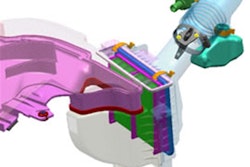The first of more than 800 new rail cars will begin showing up on CTA train lines in 2019, according to an announcement Wednesday that pushes back the agency's already-delayed next-generation train.
The revised plan to spend more than $1 billion to update the rail fleet was disclosed as the CTA board also approved construction contracts totaling more than $176 million that will go toward modernizing and expanding two Red Line stations -- Wilson in the Uptown neighborhood and the 95th Street/Dan Ryan terminal on the South Side.
Construction on both is expected to start in the fall and take several years, officials said. Station entrances will remain open.
The $203 million Wilson project replaces the station house built in 1923 with a wheelchair-accessible station and platforms that will serve as a new transfer location between Red and Purple/Evanston Express trains. The original station facade and clock tower will be restored.
The $240 million 95th Street project will replace the 45-year-old station with two stations on opposite sides of 95th, facilitating improved CTA and Pace bus operations and better pedestrian access, officials said.
Funding for both stations comes from federal, state and local sources.
The upcoming purchase of the next-generation 7000 Series rail cars will begin with an initial order of 200 cars, instead of 100 cars, CTA officials announced Wednesday. The order would ramp up to as many as 846 cars, if the transit agency exercises all contract options, officials said. The decision to double the initial base order follows the CTA's rejection last month of bids by two companies that competed for the 7000 Series contract.
Doubling the size of the base order will result in more competition and a better price for the transit agency, CTA president Forrest Claypool told the agency's board.
Claypool said the CTA expects to seek bids by early September, and prototypes for testing in Chicago should arrive in August 2018.
Delivery of production cars would then follow in August 2019, at a rate of 10 to 14 cars a month, said Chris Hegarty, CTA general manager of rail engineering and technical services.
The CTA's initial procurement plan set delivery to begin in 2016. The date was subsequently pushed back to 2018 before being postponed again, now to 2019.
The new CTA request for proposals from manufacturers will drop a requirement in last year's original tender process that the 7000 Series must be compatible with the CTA's 5000 Series cars, which are the newest current series and still being delivered by Bombardier Transit Corp.
The CTA announced last year that, based in part on rider feedback, it won't buy more cars outfitted mostly with the unpopular center-facing, scoop-seat benches that dominate the 5000 Series fleet. Riders have complained that the benches result in passengers squeezed shoulder-to-shoulder while also being at eye level to the crotches and buttocks of standing passengers, who often step on the toes of seated riders.
Instead, the 7000 Series cars will be outfitted with a combination of forward- and- rear-facing seats and some aisle-facing seats, perhaps laid out in short rows of two- and- four-seat combinations near the doors, officials said.
Bombardier and Sumitomo Corp. of America were the only two companies that competed for the 7000 Series contract when the CTA opened up bids in January. Bombardier was the low bidder.
Bombardier bid $1.39 billion to produce 846 7000 Series rail cars over 10 years. The Montreal-based company has so far delivered about 500 of 714 cars in the 5000 Series under a $1.14 billion contract, officials said. Those 5000 Series cars are operating on the Pink, Green, Red, Yellow and Purple lines, officials said.
Sumitomo and its manufacturing partner, Nippon Sharyo U.S.A., submitted a $1.55 billion bid to build the 846 7000 Series cars, officials said. The companies have not previously sold rail cars to the CTA.
CTA officials said interconnectivity between different models of rail cars is desirable but not vital to operations. They pointed out that 5000 Series cars cannot be coupled with the 3200 Series and 2600 Series because they are not electronically compatible.
There currently are about 1,200 rail cars in the CTA fleet. The CTA is looking to reduce the average age of its rail cars to less than 10 years old by 2022.












